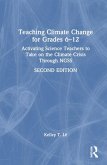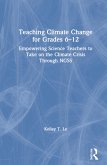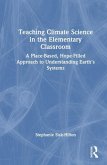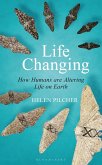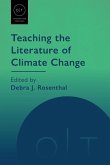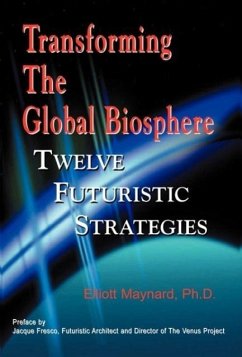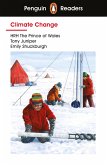Teaching Writing in the Age of Catastrophic Climate Change
Herausgeber: Everett, Justin; Mayo, Russell
Teaching Writing in the Age of Catastrophic Climate Change
Herausgeber: Everett, Justin; Mayo, Russell
- Gebundenes Buch
- Merkliste
- Auf die Merkliste
- Bewerten Bewerten
- Teilen
- Produkt teilen
- Produkterinnerung
- Produkterinnerung
This collection presents a reframing of ecocomposition theory in light of catastrophic climate change, including the possibility of civilizational collapse, as well as the practical impacts this has on the classroom.
Andere Kunden interessierten sich auch für
![Teaching Climate Change for Grades 6-12 Teaching Climate Change for Grades 6-12]() Kelley T LêTeaching Climate Change for Grades 6-12197,99 €
Kelley T LêTeaching Climate Change for Grades 6-12197,99 €![Teaching Climate Change for Grades 6-12 Teaching Climate Change for Grades 6-12]() Kelley T LêTeaching Climate Change for Grades 6-12153,99 €
Kelley T LêTeaching Climate Change for Grades 6-12153,99 €![Teaching Climate Science in the Elementary Classroom Teaching Climate Science in the Elementary Classroom]() Stephanie Sisk-HiltonTeaching Climate Science in the Elementary Classroom174,99 €
Stephanie Sisk-HiltonTeaching Climate Science in the Elementary Classroom174,99 €![Life Changing: Shortlisted for the Wainwright Prize for Writing on Global Conservation Life Changing: Shortlisted for the Wainwright Prize for Writing on Global Conservation]() Helen PilcherLife Changing: Shortlisted for the Wainwright Prize for Writing on Global Conservation23,99 €
Helen PilcherLife Changing: Shortlisted for the Wainwright Prize for Writing on Global Conservation23,99 €![Teaching the Literature of Climate Change Teaching the Literature of Climate Change]() Teaching the Literature of Climate Change110,99 €
Teaching the Literature of Climate Change110,99 €![Transforming the Global Biosphere Transforming the Global Biosphere]() Elliott MaynardTransforming the Global Biosphere27,99 €
Elliott MaynardTransforming the Global Biosphere27,99 €![Penguin Readers Level 3: Climate Change (ELT Graded Reader) Penguin Readers Level 3: Climate Change (ELT Graded Reader)]() Prince Charles, former Prince of Wales, HRHPenguin Readers Level 3: Climate Change (ELT Graded Reader)6,99 €
Prince Charles, former Prince of Wales, HRHPenguin Readers Level 3: Climate Change (ELT Graded Reader)6,99 €-
-
-
This collection presents a reframing of ecocomposition theory in light of catastrophic climate change, including the possibility of civilizational collapse, as well as the practical impacts this has on the classroom.
Hinweis: Dieser Artikel kann nur an eine deutsche Lieferadresse ausgeliefert werden.
Hinweis: Dieser Artikel kann nur an eine deutsche Lieferadresse ausgeliefert werden.
Produktdetails
- Produktdetails
- Verlag: Lexington Books
- Seitenzahl: 274
- Erscheinungstermin: 20. November 2024
- Englisch
- Abmessung: 229mm x 152mm x 20mm
- Gewicht: 526g
- ISBN-13: 9781666974782
- ISBN-10: 1666974781
- Artikelnr.: 71572137
- Herstellerkennzeichnung
- Libri GmbH
- Europaallee 1
- 36244 Bad Hersfeld
- gpsr@libri.de
- Verlag: Lexington Books
- Seitenzahl: 274
- Erscheinungstermin: 20. November 2024
- Englisch
- Abmessung: 229mm x 152mm x 20mm
- Gewicht: 526g
- ISBN-13: 9781666974782
- ISBN-10: 1666974781
- Artikelnr.: 71572137
- Herstellerkennzeichnung
- Libri GmbH
- Europaallee 1
- 36244 Bad Hersfeld
- gpsr@libri.de
Edited by Justin Everett and Russell Mayo - Contributions by Justin Everett; Russell Mayo; Julie Collins Bates; Yavanna M. Brownlee; Elisa Cogbill-Seiders; Kim Freeman; Zachary Garrett; Mark Houston; Juliette Lapeyrouse-Cherry; Kimberly Rose Moekle; Matth
Foreword: Weaving Words and Worlds: Ecocomposition in the Anthropocene by
Christian Weisser
Acknowledgments
Introduction: Teaching Writing in the Age of Catastrophic Climate Change by
Justin Everett and Russell Mayo
Part I: Storytelling and Climate Justice Pedagogies
Chapter 1: Alice in a Warmer Wonderland: Climate Rhetoric in the Ecocomp
Classroom by Kimberly Rose Moekle
Chapter 2: Emphasizing the Words and Expertise of Those Most at Risk: A
Decolonial Feminist Ecocomposition Pedagogy by Julie Collins Bates
Chapter 3: The Never-Ending Story: Teaching Climate Change, Research, and
Interdisciplinary Narrative by Kim Freeman
Part II: Teaching Writing with Place and Space
Chapter 4: Whose Job Is It? College Composition and the Exigence of Climate
Crisis by Elisa Cogbill-Seiders
Chapter 5: Mapping the Intersections of Ecocomposition and Environmental
Humanities: Exploring Carbon Energy Impacts, Local Places, and Global
Contexts in the Writing Classroom by Juliette Lapeyrouse-Cherry
Chapter 6: Ecocomposition in the Writing Center: A Comparative Case Study
of Ecology and (Post)Sustainability by Russell Mayo and Skye Roberson
Part III: Rhetoric-Science Interchanges
Chapter 7: A Gateway Drug for Science Literacy and Moral Action: Climate
Change in the Composition Classroom by Zachary Garrett
Chapter 8: Messy Plates: Using Food-Themed Writing Courses to Resist
Anthropocene Disorder by Mark Houston
Chapter 9: Situated Writing Within the Transition Town Movement: Inscribing
Hope in the Age of Climate Change by Justin Everett
Part IV: Emotion, Affect, and Relationality
Chapter 10: Wicked Questions: An Ecocomposition Program for the
Anthropocene by Matthew Newcomb
Chapter 11: Teaching Tactics that Intervene in and Resist Matters of
Climate Catastrophe by Lisa L. Phillips
Chapter 12: Addressing Climate Change Panic through Relational Practice by
Yavanna M. Brownlee
About the Contributors
Christian Weisser
Acknowledgments
Introduction: Teaching Writing in the Age of Catastrophic Climate Change by
Justin Everett and Russell Mayo
Part I: Storytelling and Climate Justice Pedagogies
Chapter 1: Alice in a Warmer Wonderland: Climate Rhetoric in the Ecocomp
Classroom by Kimberly Rose Moekle
Chapter 2: Emphasizing the Words and Expertise of Those Most at Risk: A
Decolonial Feminist Ecocomposition Pedagogy by Julie Collins Bates
Chapter 3: The Never-Ending Story: Teaching Climate Change, Research, and
Interdisciplinary Narrative by Kim Freeman
Part II: Teaching Writing with Place and Space
Chapter 4: Whose Job Is It? College Composition and the Exigence of Climate
Crisis by Elisa Cogbill-Seiders
Chapter 5: Mapping the Intersections of Ecocomposition and Environmental
Humanities: Exploring Carbon Energy Impacts, Local Places, and Global
Contexts in the Writing Classroom by Juliette Lapeyrouse-Cherry
Chapter 6: Ecocomposition in the Writing Center: A Comparative Case Study
of Ecology and (Post)Sustainability by Russell Mayo and Skye Roberson
Part III: Rhetoric-Science Interchanges
Chapter 7: A Gateway Drug for Science Literacy and Moral Action: Climate
Change in the Composition Classroom by Zachary Garrett
Chapter 8: Messy Plates: Using Food-Themed Writing Courses to Resist
Anthropocene Disorder by Mark Houston
Chapter 9: Situated Writing Within the Transition Town Movement: Inscribing
Hope in the Age of Climate Change by Justin Everett
Part IV: Emotion, Affect, and Relationality
Chapter 10: Wicked Questions: An Ecocomposition Program for the
Anthropocene by Matthew Newcomb
Chapter 11: Teaching Tactics that Intervene in and Resist Matters of
Climate Catastrophe by Lisa L. Phillips
Chapter 12: Addressing Climate Change Panic through Relational Practice by
Yavanna M. Brownlee
About the Contributors
Foreword: Weaving Words and Worlds: Ecocomposition in the Anthropocene by
Christian Weisser
Acknowledgments
Introduction: Teaching Writing in the Age of Catastrophic Climate Change by
Justin Everett and Russell Mayo
Part I: Storytelling and Climate Justice Pedagogies
Chapter 1: Alice in a Warmer Wonderland: Climate Rhetoric in the Ecocomp
Classroom by Kimberly Rose Moekle
Chapter 2: Emphasizing the Words and Expertise of Those Most at Risk: A
Decolonial Feminist Ecocomposition Pedagogy by Julie Collins Bates
Chapter 3: The Never-Ending Story: Teaching Climate Change, Research, and
Interdisciplinary Narrative by Kim Freeman
Part II: Teaching Writing with Place and Space
Chapter 4: Whose Job Is It? College Composition and the Exigence of Climate
Crisis by Elisa Cogbill-Seiders
Chapter 5: Mapping the Intersections of Ecocomposition and Environmental
Humanities: Exploring Carbon Energy Impacts, Local Places, and Global
Contexts in the Writing Classroom by Juliette Lapeyrouse-Cherry
Chapter 6: Ecocomposition in the Writing Center: A Comparative Case Study
of Ecology and (Post)Sustainability by Russell Mayo and Skye Roberson
Part III: Rhetoric-Science Interchanges
Chapter 7: A Gateway Drug for Science Literacy and Moral Action: Climate
Change in the Composition Classroom by Zachary Garrett
Chapter 8: Messy Plates: Using Food-Themed Writing Courses to Resist
Anthropocene Disorder by Mark Houston
Chapter 9: Situated Writing Within the Transition Town Movement: Inscribing
Hope in the Age of Climate Change by Justin Everett
Part IV: Emotion, Affect, and Relationality
Chapter 10: Wicked Questions: An Ecocomposition Program for the
Anthropocene by Matthew Newcomb
Chapter 11: Teaching Tactics that Intervene in and Resist Matters of
Climate Catastrophe by Lisa L. Phillips
Chapter 12: Addressing Climate Change Panic through Relational Practice by
Yavanna M. Brownlee
About the Contributors
Christian Weisser
Acknowledgments
Introduction: Teaching Writing in the Age of Catastrophic Climate Change by
Justin Everett and Russell Mayo
Part I: Storytelling and Climate Justice Pedagogies
Chapter 1: Alice in a Warmer Wonderland: Climate Rhetoric in the Ecocomp
Classroom by Kimberly Rose Moekle
Chapter 2: Emphasizing the Words and Expertise of Those Most at Risk: A
Decolonial Feminist Ecocomposition Pedagogy by Julie Collins Bates
Chapter 3: The Never-Ending Story: Teaching Climate Change, Research, and
Interdisciplinary Narrative by Kim Freeman
Part II: Teaching Writing with Place and Space
Chapter 4: Whose Job Is It? College Composition and the Exigence of Climate
Crisis by Elisa Cogbill-Seiders
Chapter 5: Mapping the Intersections of Ecocomposition and Environmental
Humanities: Exploring Carbon Energy Impacts, Local Places, and Global
Contexts in the Writing Classroom by Juliette Lapeyrouse-Cherry
Chapter 6: Ecocomposition in the Writing Center: A Comparative Case Study
of Ecology and (Post)Sustainability by Russell Mayo and Skye Roberson
Part III: Rhetoric-Science Interchanges
Chapter 7: A Gateway Drug for Science Literacy and Moral Action: Climate
Change in the Composition Classroom by Zachary Garrett
Chapter 8: Messy Plates: Using Food-Themed Writing Courses to Resist
Anthropocene Disorder by Mark Houston
Chapter 9: Situated Writing Within the Transition Town Movement: Inscribing
Hope in the Age of Climate Change by Justin Everett
Part IV: Emotion, Affect, and Relationality
Chapter 10: Wicked Questions: An Ecocomposition Program for the
Anthropocene by Matthew Newcomb
Chapter 11: Teaching Tactics that Intervene in and Resist Matters of
Climate Catastrophe by Lisa L. Phillips
Chapter 12: Addressing Climate Change Panic through Relational Practice by
Yavanna M. Brownlee
About the Contributors


